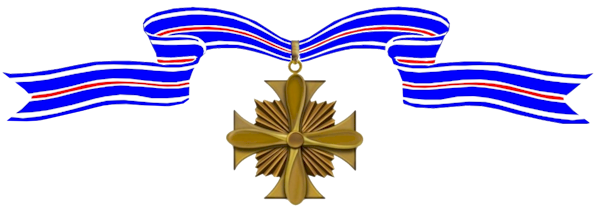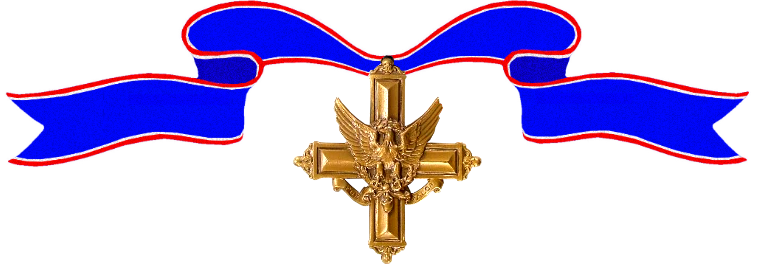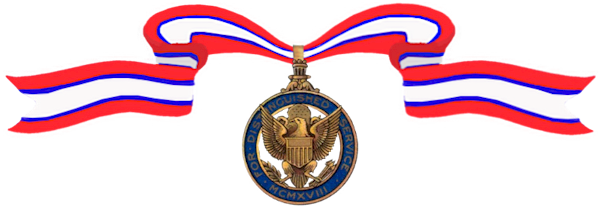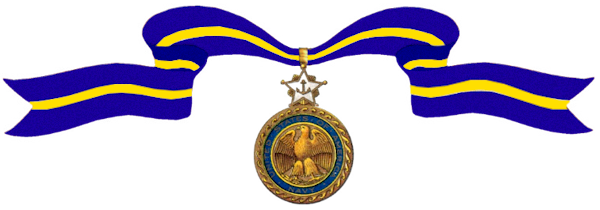The President of the United States of America, authorized by Act of Congress, July 2, 1926, takes pleasure in presenting the Distinguished Flying Cross (Air Force Award) to General of the Army Douglas MacArthur (ASN: 0-57), United States Army, for heroism while participating in aerial flight as Commander-in-Chief, Far East, and Commander-in-Chief, United Nations Command, during the period 29 June to 20 October 1950. On 29 June General MacArthur made a flight to Suwon, Korea, during which his aircraft was subjected to effective interception by hostile air action. Another friendly aircraft in the area was attacked and destroyed by enemy air immediately prior to General MacArthur’s landing, and the Suwon airstrip itself was bombed and strafed during the course of his visit. On 27 July he made a flight to Taegu, Korea, during which his aircraft was again subject to hostile air interception and at which time the ground situation in the immediate area was most precarious. On 29 September, General MacArthur made a flight to Kimpo, Korea, again under conditions presenting the threat of hostile air interception and while the Kimpo airfield itself was subject to hostile ground fire. On 20 October he made a flight to the Sukchon-Sunchon area of Korea in order to observe and supervise the para-drop of the 187th Airborne Regimental Combat Team. During this entire operation his aircraft was subject to attack by enemy aircraft known to be based at Sinuiju. These aerial flights in an unarmed aircraft were made by General MacArthur in furtherance of his mission as Commander of the United Nations forces in Korea. Each flight involved the risk of death or capture by the enemy. In General MacArthur’s case this risk was multiplied a hundred-fold in view of his personal stature and his position as Commander-in-Chief. That General MacArthur unhesitatingly took part in these extraordinarily important and dangerous missions is a further demonstration of the unfaltering devotion to duty which characterizes his every action as a leader. His conduct in these instances has been an outstanding source of inspiration to the men he commands. Throughout the Korean campaign the strategic concepts underlying General MacArthur’s command decisions have reflected a superb understanding of the most advantageous employment of air power and made possible the victory which is being achieved with minimum losses and unprecedented speed. By his heroism and extraordinary achievement, General Douglas MacArthur reflects the highest honor upon himself, the United Nations, and the Armed Forces of the United States.

Awards Received
-

Silver Star
-

Distinguished Service Cross
-

Silver Star
-

Distinguished Service Cross
-

Silver Star
-

Army Distinguished Service Medal
-

Navy Distinguished Service Medal
-

Silver Star
-

Distinguished Service Cross
-

Army Distinguished Service Medal
-
Silver Star
Service:
United States ArmyRank:
Colonel (Corps of Engineers)Division:
42d Division, American Expeditionary ForcesAction Date:
September 12, 1918
Headquarters, 42d Division, General Orders No. 22 (March 29, 1919)(Citation Needed) – SYNOPSIS: The President of the United States of America, authorized by Act of Congress July 9, 1918, takes pleasure in presenting a Fourth Bronze Oak Leaf Cluster in lieu of a Fifth Award of the Silver Star to Colonel (Corps of Engineers) Douglas MacArthur (ASN: 0-57), United States Army, for conspicuous gallantry and intrepidity in action while serving as Chief of Staff, 42d Division, American Expeditionary Forces, in action in France on 12 September 1918. The gallant actions and dedicated devotion to duty demonstrated by Colonel MacArthur, without regard for his own life, were in keeping with the highest traditions of military service and reflect great credit upon himself and the United States Army.
-
Distinguished Service Cross
Service:
United States ArmyRank:
Brigadier GeneralDivision:
42d Division, American Expeditionary ForcesAction Date:
October 14 – 16, 1918
War Department, General Orders No. 27 (1919)The President of the United States of America, authorized by Act of Congress, July 9, 1918, takes pleasure in presenting a Bronze Oak Leaf Cluster in lieu of a Second Award of the Distinguished Service Cross to Brigadier General (Corps of Engineers) Douglas MacArthur (ASN: 0-57), United States Army, for extraordinary heroism in action while serving as Chief of Staff, 42d Division, American Expeditionary Forces, near Cote-de-Chatillon, France, October 14 – 16, 1918: As brigade commander General MacArthur personally led his men and by the skillful maneuvering of his brigade made possible the capture of Hills 288, 242, and the Cote-de-Chatillon, France, 14 – 16 October 1918. He displayed indomitable resolution and great courage in rallying broken lines and in reforming attacks, thereby making victory possible. On a field where courage was the rule, his courage was the dominant feature.
-
Silver Star
Service:
United States ArmyRank:
Colonel (Corps of Engineers)Division:
42d Division, American Expeditionary ForcesAction Date:
July 15, 1918
Headquarters, 42d Division, General Orders No. 22 (March 29, 1919)(Citation Needed) – SYNOPSIS: The President of the United States of America, authorized by Act of Congress July 9, 1918, takes pleasure in presenting a Bronze Oak Leaf Cluster in lieu of a Second Award of the Silver Star to Colonel (Corps of Engineers) Douglas MacArthur (ASN: 0-57), United States Army, for gallantry in action while serving as Chief of Staff, 42d Division, American Expeditionary Forces, in action in France, on 15 July 1918. The gallant actions and dedicated devotion to duty demonstrated by Colonel MacArthur, without regard for his own life, were in keeping with the highest traditions of military service and reflect great credit upon himself and the United States Army.
-
Distinguished Service Cross
Service:
United States ArmyRank:
General of the ArmyDivision:
U.S. Army Forces in the Far East (USAFFE)Action Date:
January 26, 1945
War Department, General Orders No. 46 (May 23, 1946)The President of the United States of America, authorized by Act of Congress, July 9, 1918, takes pleasure in presenting a Second Bronze Oak Leaf Cluster in lieu of a Third Award of the Distinguished Service Cross to General of the Army Douglas Macarthur (ASN: 0-57), United States Army, for extraordinary heroism in connection with military operations against an armed enemy as Commanding General, U.S. Army Forces in the Far East (USAFFE), in action against enemy forces on 26 January 1945, while visiting the 25th Division in combat at San Manuel, Luzon, Philippine Islands. On that date, General MacArthur advanced within 75 yards of the enemy lines to a point where two men had just been killed and several wounded by Japanese fire and which was still under heavy attack by enemy small arms, mortar, and cannon. Hidden enemy machine gunners and riflemen were opposing the advance with deliberately aimed cross-fire which intermittently covered the area. General MacArthur’s example in the face of enemy fire, was a source of inspiration to the men of the 25th Division and was in keeping with the highest traditions of the military forces of the United States.
-
Silver Star
Service:
United States ArmyRank:
Colonel (Corps of Engineers)Division:
42d Division, American Expeditionary ForcesAction Date:
February 26, 1918
Headquarters, 42d Division, General Orders No. 22 (March 29, 1919)(Citation Needed) – SYNOPSIS: The President of the United States of America, authorized by Act of Congress July 9, 1918, takes pleasure in presenting the Silver Star to Colonel (Corps of Engineers) Douglas MacArthur (ASN: 0-57), United States Army, for extraordinary heroism and gallantry while serving as Chief of Staff, 42d Division, American Expeditionary Forces, in action near Rechicourt, France, on 26 February 1918. The gallant actions and dedicated devotion to duty demonstrated by Colonel MacArthur, without regard for his own life, were in keeping with the highest traditions of military service and reflect great credit upon himself and the United States Army.
-
Army Distinguished Service Medal
Service:
United States ArmyRank:
General of the ArmyAction Date:
October 20, 1944 – July 4, 1945
Department of the Army, General Orders No. 27 (April 19, 1948)The President of the United States of America, authorized by Act of Congress July 9, 1918, takes pleasure in presenting a Third Bronze Oak Leaf Cluster in lieu of a Fourth Award of the Army Distinguished Service Medal to General of the Army Douglas MacArthur (ASN: 0-57), United States Army, for exceptionally meritorious and distinguished services to the Government of the United States, in a duty of great responsibility, during the period 20 October 1944 to 4 July 1945. As Supreme Commander of Allied Air, Ground and Sea Forces in the Southwest Pacific, General of the Army Douglas MacArthur planned and personally directed the campaigns which resulted in the liberation of the Philippine Islands. Strongly entrenched and superior enemy forces were overwhelmed and completely destroyed in a series of decisive operations and exploiting U.S. Air and Sea superiority, coupled with the resolute and courageous fighting of the Ground Forces. The immediate result of the campaign was control of the China sea, the isolation of Japanese Forces in Burma, Malaysia and Indo-China and the termination of coastwise traffic supporting the Japanese Armies in Central and South China. The liberation of the Philippines began with the landings on Leyte on 20 October in which complete strategic surprise was achieved. After bitter fighting under most difficult conditions of weather and terrain, General MacArthur destroyed the Japanese forces which included the noted 1st Division of the Kvantung Army. Again surprising the enemy, General MacArthur moved his forces boldly up the Western Coast of the main Philippine Island and effected a landing on the shores of Lingayen Gulf on 9 January 1945. The flawless execution of this hazardous amphibious approach and landing so disorganized the enemy that in a series of deep thrusts Manila was liberated on 25 February. The fortress of Corregidor fell soon afterward in a brilliantly conceived and directed combined land, sea and air operation. By the end of June only isolated groups of enemy remained in Luzon. While the United States SIXTH Army was so engaged, EIGHTH Army units cleared the enemy from the Southern Islands in a series of amphibious operations. By 4 July organized resistance had terminated, completing the liberation of the Philippine Islands and the 17,000,000 inhabitants from Japanese domination. More than 300,000 dead and 7,000 prisoners were lost by the enemy, our casualties in killed, wounded and missing totaling 60, 628. Seventeen of our divisions had opposed and defeated twenty-three enemy divisions. The air, ground, and naval forces worked in complete unison to inflict this crushing disaster on the Japanese Army.
-
Navy Distinguished Service Medal

The President of the United States of America takes pleasure in presenting the Navy Distinguished Service Medal to General Douglas MacArthur (ASN: 0-57), United States Army, for exceptionally meritorious and distinguished service in a position of great responsibility to the Government of the United States in a position of great responsibility in the Southwest Pacific Area from February to October 1944.
-
Silver Star
Service:
United States ArmyRank:
Colonel (Corps of Engineers)Division:
42d Division, American Expeditionary ForcesAction Date:
July 29, 1918
Headquarters, 42d Division, General Orders No. 22 (March 29, 1919)(Citation Needed) – SYNOPSIS: The President of the United States of America, authorized by Act of Congress July 9, 1918, takes pleasure in presenting a Third Bronze Oak Leaf Cluster in lieu of a Fourth Award of the Silver Star to Colonel Douglas MacArthur (ASN: 0-57), United States Army, for gallantry in action while serving as Chief of Staff, 42d Division, American Expeditionary Forces, in action in France on 29 July 1918. The gallant actions and dedicated devotion to duty demonstrated by Colonel MacArthur, without regard for his own life, were in keeping with the highest traditions of military service and reflect great credit upon himself and the United States Army.
-
Distinguished Service Cross
Service:
United States ArmyRank:
Brigadier GeneralDivision:
42d Division, American Expeditionary ForcesAction Date:
March 9, 1918
War Department, General Orders No. 27 (1919)The President of the United States of America, authorized by Act of Congress, July 9, 1918, takes pleasure in presenting the Distinguished Service Cross to Brigadier General (Corps of Engineers) Douglas MacArthur (ASN: 0-57), United States Army, for extraordinary heroism in action while serving as Chief of Staff, 42d Division, American Expeditionary Forces, in the Salient-du-Feys, France, 9 March 1918. When Company D, 168th Infantry, was under severe attack in the salient du Feys, France, General MacArthur voluntarily joined it, upon finding that he could do so without interfering with his normal duties, and by his coolness and conspicuous courage aided materially in its success.
-
Army Distinguished Service Medal
Service:
United States ArmyRank:
Brigadier GeneralDivision:
42d Division, American Expeditionary ForcesAction Date:
World War I
War Department, General Orders No. 59 (1919)The President of the United States of America, authorized by Act of Congress, July 9, 1918, takes pleasure in presenting the Army Distinguished Service Medal to Brigadier General Douglas MacArthur (ASN: 0-57), United States Army, for exceptionally meritorious and distinguished services to the Government of the United States, in a duty of great responsibility during World War I. General MacArthur served with credit as Chief of Staff of the 42d Division in the operations at Chalons and at the Chateau-Thierry salient. In command of the 84th Infantry Brigade, he showed himself to be a brilliant commander of skill and judgment. Later he served with distinction as Commanding General of the 42d Division.

